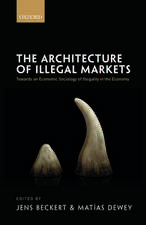Knowledge, Options, and Institutions
Autor Bruce Koguten Limba Engleză Paperback – 3 ian 2008
| Toate formatele și edițiile | Preț | Express |
|---|---|---|
| Paperback (1) | 357.22 lei 31-37 zile | |
| OUP OXFORD – 3 ian 2008 | 357.22 lei 31-37 zile | |
| Hardback (1) | 792.16 lei 31-37 zile | |
| OUP OXFORD – 3 ian 2008 | 792.16 lei 31-37 zile |
Preț: 357.22 lei
Preț vechi: 388.14 lei
-8% Nou
Puncte Express: 536
Preț estimativ în valută:
68.35€ • 71.56$ • 56.56£
68.35€ • 71.56$ • 56.56£
Carte tipărită la comandă
Livrare economică 25-31 martie
Preluare comenzi: 021 569.72.76
Specificații
ISBN-13: 9780199282531
ISBN-10: 0199282536
Pagini: 388
Ilustrații: Figures and tables
Dimensiuni: 155 x 232 x 22 mm
Greutate: 0.58 kg
Editura: OUP OXFORD
Colecția OUP Oxford
Locul publicării:Oxford, United Kingdom
ISBN-10: 0199282536
Pagini: 388
Ilustrații: Figures and tables
Dimensiuni: 155 x 232 x 22 mm
Greutate: 0.58 kg
Editura: OUP OXFORD
Colecția OUP Oxford
Locul publicării:Oxford, United Kingdom
Notă biografică
Bruce Kogut received his Ph.D. from MIT, has been a chaired professor at Wharton (University of Pennsylvania) and at INSEAD (Fontainebleau), and as of September 2007 the Bernstein Chaired Professor at Columbia University. Awarded an honorary doctorate at the Stockholm School of Economics where he has often been a visiting professor, he has also been a visitor at the Ecole Polytechnique, the Wissenschaftszentrum in Berlin, and the Santa Fe Institute. He is on the principal orginators of the theory of the firm as a reservoir of knowledge and capabilities embedded in social networks. In addition, he introduced the use of real options into strategy in reference to joint ventures and multinational production, and the study of institutions as critical to the study of the diffusion of best practices.






















